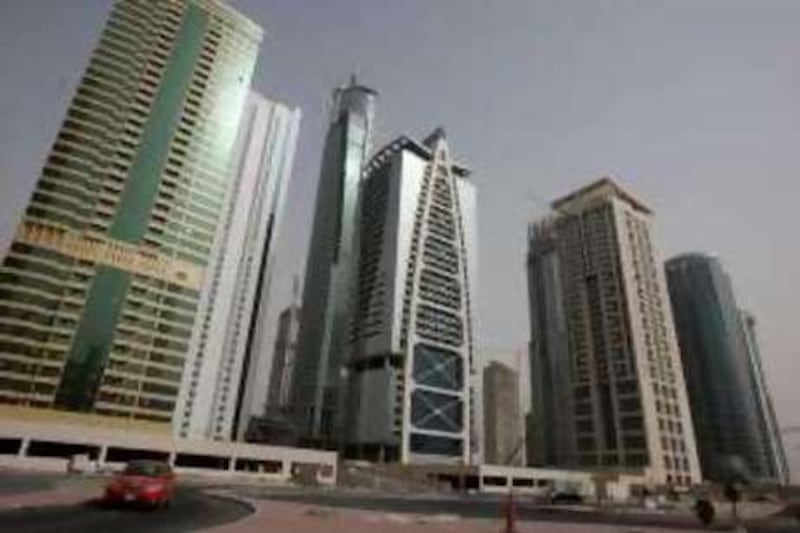Abu Dhabi // As developers and buyers feel the financial pinch of the slowing property market and dampened global growth, the two sides are getting into more disputes, lawyers and analysts say. "Whenever you get turmoil, you get disputes," said Chris Dommet, the chief executive of the Dubai office of mortgage broker John Charcol. "When everything is going well and everyone is making money, everything is fine. But when the market moves the other way, you get disputes all along the way, from developers to banks to clients."
Most of the fallout is coming from buyers who assumed prices would keep rising rapidly, those having difficulty obtaining financing for their purchases and those who are only now realising their contracts were not what they expected, said Tom O'Grady, a partner at DLA Piper in Dubai. "We are seeing higher levels of inquiries from buyers about their options," Mr O'Grady said. "It's coming alongside the sort of quieting of the market."
Buyers at Hydra Village, a residential community of 2,500 houses near the Abu Dhabi airport, said they recently saw the prices of their homes unexpectedly rise by as much 15 per cent when Hydra Properties announced a redesign of the project with larger homes. Carolyn Munson, an American who owns two two-bedroom houses in the project, said the decision to increase building sizes should not have been made without the consent of owners.
"They are imposing decisions on our behalf and that's unfortunate," she said. "This would have been one thing if we had contracts early on, but at this point we have zero recourse." While some buyers said they welcomed the expanded floor plans and considered the rate for the extra space reasonable, some complained that they were not given an option about whether to accept a larger home. There were also concerns about raising the financing required to meet the higher prices, especially for those who had bought several units.
Under the plan, the additional cost would be based on the development's original prices and come due upon completion in 2010. Sulaiman al Fahim, the chief executive of Hydra Properties, said the designs were changed because the original plan included houses that were too small. The overall project did not incorporate enough green space, he said. "We tried to make it a really green development so we changed the whole masterplan to reduce the density, make more green areas and build green buildings," he said. Many of the villas were "too small for a normal family to live in" and were expanded by 107 to 129 square feet. He said the company had received positive feedback from buyers.
Meanwhile, in Dubai several buyers said they were refusing to pay their next instalment for homes they bought at Emaar's Warsan Estate project because they were not informed of a sewage plant being built close by. "We were misled and then let down by Emaar," said Arshad Hussain, one of the buyers refusing to pay. He said he had been pressured into buying the property in a rush. "Once I realised about the plant, I informed my family and they said they wouldn't want to live next to a sewage plant" said Adel Momar, an Australian citizen who had bought a villa for his family. "From that time I tried to sell this villa. But no one wants to buy it. Everybody just laughs. Some buyers have even tried to put theirs on the market Dh30,000 (US$8,166) below the opening price and have not succeeded."
Emaar officials said the company properly informed customers and behaved appropriately. "Purchasers have been adequately informed, as is the case with any of Emaar's projects, including Warsan Estate," a spokesman said. He said Emaar had provided a detailed map showing the location of the development. Similarly, a group of investors said they lost 5 per cent of their investment in just weeks when Damac Properties suddenly cut prices.
Matthew Mueller, a managing partner at Mueller and Namejko in Washington, said he and his partners had bought a full floor of Burjside Terrace as an investment. Because they bought in bulk, they were given a 5 per cent discount, but five weeks after the purchase, Damac dropped prices by 10 per cent, he said. "It would have been pretty good information to receive before we bought," he said of the price cut. Mr Mueller said the group was eventually able to transfer his investment into some other properties with the company in the hopes that they could salvage their initial investment.
Niall McLoughlin, a spokesman for Damac Properties, said the price cut was part of a Ramadan special offering and the company had acted appropriately. "Like may companies in this part of the world, we have festive promotions around Ramadan, Eid and Dubai Shopping Festival where we offer discounts and value additions," he said. The disputes are leading to calls for more regulation. Fadi Antar, the operations manager of Better Homes Abu Dhabi, said confidence in property developers' ability to deliver projects on time and according to their promises would become essential as the market matured. He said the municipality should regulate areas such as stage payments, completion dates and sales contracts and respond swiftly to the concerns of investors.
"At the moment, the only option for a client with a serious complaint is to sue," he said. @Email:bhope@thenational.ae rditcham@thenational.ae ngillet@thenational.ae






